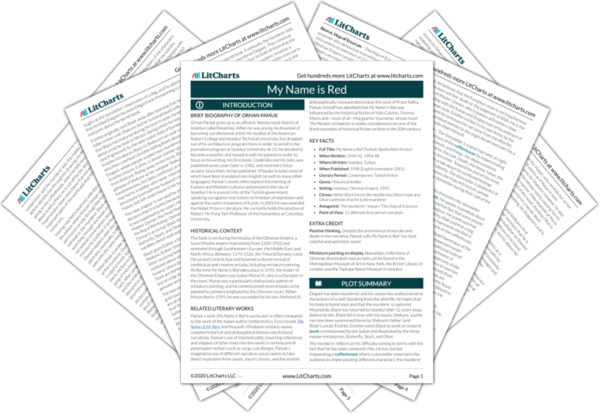Like dancing, music, and painting, coffee is a controversial phenomenon within the world of the book, with some characters praising its virtues and others denouncing it as a sin. Coffee is thought to have arrived in Istanbul from other parts of the Islamic world in the mid-16th century, only a few decades before the novel is set. As a result, coffee is still new to Istanbul, and is the cause of both great excitement and anger. The storyteller represents the pro-coffee faction in Istanbul, speaking enthusiastically about coffee and impersonating a Tree who claims that giving up coffee can lead to the degeneration of the mind. On the other hand, the fundamentalist Erzurumis and other religious zealots denounce coffee as a sinful vice. Coffee thus becomes a controversial symbol of cosmopolitanism, pleasure, and religious liberalism—much like realist painting. It’s significant to note that the future of coffee—like the future of traditional Muslim religious life—is left uncertain in the novel. Near the book’s end, the Erzurumis descend on the coffeehouse, destroy it, and kill the storyteller. This event suggests that coffee culture—and tolerant, cosmopolitan culture in general—will continue to have a vexed future in Istanbul.
Coffee Quotes in My Name is Red
I heard tell that this Husret Hoja, taking matters even further, declared with spittle flying from his mouth, "Ah, my devoted believers! The drinking of coffee is an absolute sin! Our Glorious Prophet did not partake of coffee because he knew it dulled the intellect, caused ulcers, hernia and sterility; he understood that coffee was nothing but the Devil's ruse. Coffeehouses are places where pleasure-seekers and wealthy gadabouts sit knee-to-knee, involving themselves in all sorts of vulgar behavior; in fact, even before the dervish houses are closed, coffeehouses ought to be banned. Do the poor have enough money to drink coffee? Men frequent these places, become besotted with coffee and lose control of their mental faculties to the point that they actually listen to and believe what dogs and mongrels have to say.










